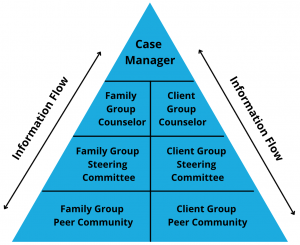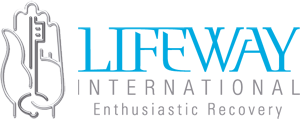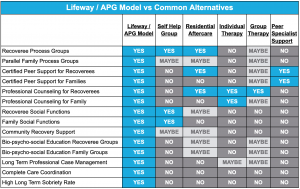
The APG Difference
APGs operate collectively with all other levels of care and beyond up to the point of reaching long term recovery as an APG is the only model that embraces Complete Care Coordination and long term professional case management that reaches the 18-48 month mark. Consequently, APGs also hold an incredibly strong record for getting more recoveree’s to long term sobriety than other more commonly used approaches.
Below is a service comparison chart of Lifeway / APG Model vs Common Alternatives:
Evidence-based Treatment Research on APGs and Long Term Recovery
In a study done at Baylor College of Medicine, it found >80% of recoverees who successfully completed an APG outpatient program and stayed active in an APG went on to achieve a minimum of 2 years of sobriety. While another, 15 year study conducted by the same research team at Baylor found 74.1% of recoverees who stayed highly active in an APG were still sober at 5 years out. Furthermore, The Recovery Research Institute of Massachusetts General Hospital, an affiliate of Harvard Medical School, dedicated to the advancement of addiction treatment and recovery, defines 5 years of continued remission as ‘the point at which the risk of meeting criteria for a substance use disorder in the following year is no greater than that of the general population’.
Peer Influence and The Directions We Grow
Numerous peer influence studies illustrate how people strive to be similar to and adopt the values of those they surround themselves with. In other words, ‘who we hang with affects the directions we grow’. Depending on one’s peer group choices this can be a race to the top as is promoted in the APG adage ‘stick with winners’. Or alternatively, it can be a race to the bottom which is usually the case with active users as they, consciously or subconsciously, seek out those who have lower moral standards than they do in order to safeguard themselves from being called out / judged for their own bad choices.
Played out, untreated substance use disorder (SUD) leads addicts to one of two places: death or institutions. These tragic paths are littered with individuals who think the insanity and chaos created by the disease is a normal part of life. Alternatively, when an individual with SUD maintains a positive peer group, their growth efforts are bolstered by positive peer pressure. A recoveree’s consistent interaction with and accountability from a positive peer recovery network leads them to developing a wider acceptance of healthy boundaries.
Alternative Peer Group Culture
Alternative Peer Groups (APGs) are built around these findings in that they provide a group of peers who value sobriety and have found ways to maintain a recovery-focused lifestyle. An APG culture is carefully cultivated to promote social connections, reaching out to others, fun, and acceptance. It is common for a staff member to task their Steering Committee with identifying newcomers or struggling members and assign one or more strong members to reach out and build a relationship with those identified. Through diligent and strategic effort, APG staff promote the sharing of principles, beliefs, and goals by utilizing positive peer influence in a direction that benefits all members.
The Family Component
In an Alternative Peer Group Program the family component is critical. It is through family staff can enact interventive strategies or discourage sabotage. It is through the family program staff can discover additional information that aids in better pinpointing current client recovery needs and structure healing activities in order to address them. Through the family program staff can organize social activities that create a wide variety of family and individual opportunities for personal growth and the development of interpersonal skills.
APG Structured Safety Net
APGs provide an increased level of structure and accountability not found in more commonly used approaches up to the point of long term sobriety attainment (18-48 months) when a client is Awakened i.e. discharged. Within the APG program, information flows up and down the accountability hierarchy helping the case manager and team better triangulate, identify, and address client needs. Additionally, due to the lengthy, addiction imposed, aberrant psychology healing process lasting 18-48 months on average, an APGs structured safety net better catches clients for if/when they fall.

Participation
The only criteria for admittance into an APG is that both the client and family display a need to rid themselves of substance use disorder and its related issues. Oftentimes, family members begin participating in an APG while a client is still in residential treatment and unable to participate in the APG until they discharge to a lower level of care.
Contact us for a Strategy Appointment and get set up with Complete Care Coordination.
Schedule a Strategy Appointment Today
Or if you’d like to learn more about our Alternative Peer Group programs, give us a call at (713) 459-9427 and we’ll be happy to answer your questions.


